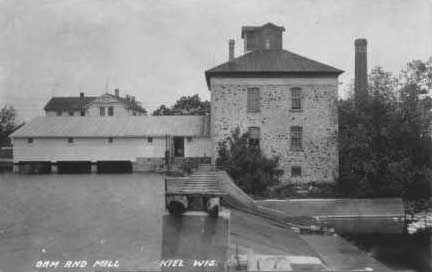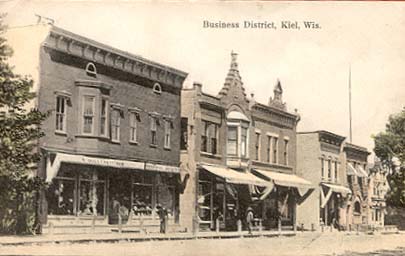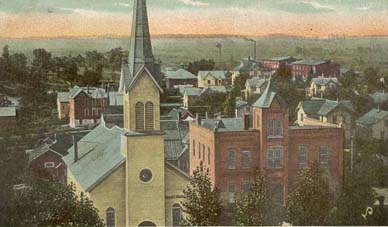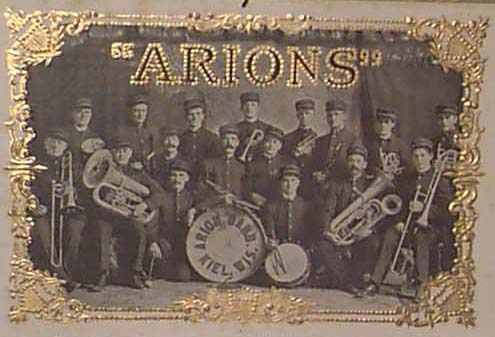|
THE VILLAGE OF KIEL
From "A History of Northern Wisconsin, 1881
This is a pleasant little village of 400 inhabitants, situated in the
town of Schleswig, on the line of the Wisconsin Central Railroad, a
few miles southeast of New Holstein, Calumet Co. Located in the midst of
as good a farming country as can be found anywhere in the county. The
general trade of the village is good. C. Heins, A. Mesch & Co.,
A. Lindner, F. Krieger and others, carry a large assortment in the general
line. J. Duecker & Co., and G.H. Simon, are the most prominent dealers in
hardware. J. Ruppenthal operates the only wagon manufactory in town; and
other trades are well represented.
W.C. Reseburg, John and F. Duecker have just formed a partnership for
the manufacture of syrup from sugar cane, this latter branch of agriculture
being carried on to considerable extent in the country around Kiel. The
factory and machinery have been built and put into running order at a cost
of $4,500. This is the only establishment of the kind in Manitowoc County,
and is a great addition to the business interests of Kiel. During that
portion of the season when the syrup factory would be idle, the proprietors
will use the engine and machinery for planing purposes.
Gutheil Bros.' Brewery was erected in 1858 by Bernhard and Ferdinand
Gutheil. In 1866, the latter removed to Chilton, Louis Gutheil, the
present member of the firm, being taken into partnership. The capacity of
the brewery is about 500 barrels of beer per annum
F. Mohr's cheese factory was erected in 1877, and is one of the leading
manufactories of Kiel.
 Besides her business, which is good for so small a place, Kiel has a
district school, located in the village, taught by A. Wittmann. It
consists of three grades. There is a Catholic church, in charge of Rev.
Father August Schleyer, who also is pastor of the St. Anna society, Calumet
County, and a flourishing Lutheran Church, under the pastorate of Rev. L.
Zenk.
Besides her business, which is good for so small a place, Kiel has a
district school, located in the village, taught by A. Wittmann. It
consists of three grades. There is a Catholic church, in charge of Rev.
Father August Schleyer, who also is pastor of the St. Anna society, Calumet
County, and a flourishing Lutheran Church, under the pastorate of Rev. L.
Zenk.
Among the old settlers who have materially assisted in the growth of
Kiel, and who still reside in the village, may be mentioned the Gutheil
Brothers, August and F. Krieger, Charles Heins, J. Ruppenthal, John Barth
and A. Guerbing.
THE VILLAGE OF KIEL 2
From "History of Manitowoc County" by Dr. Louis Falge, 1912 Vol. 1, pg. 219,342
The village of Kiel dates back to 1855, at which time H. F. Belitz and F. R. Gutheil purchased a part of the present site. A private school (open but a few months in the year) was established the same year.
The village’s perceptible growth began in 1859, after the construction of the Sheboygan and Lake Winnebago plank road, which passed through the place. This turnpike was a toll road until the beginning of the present century when it became a free highway. It was less difficult to build a road to Sheboygan in the primeval days than to the county seat at Manitowoc and hence the southwestern part of the county, in a commercial sense, became tributary to Sheboygan.
 After the completion of the road a postoffice was established at Kiel. The first industrial establishment was the erection of a sawmill by H. F. Belitz in 1859, the Sheboygyn River passing through the place, furnishing excellent water power for that purpose. Gutheil Brothers built a brewery about the same time but in 1866 their plant was moved to Chilton in the neighboring county. After the completion of the road a postoffice was established at Kiel. The first industrial establishment was the erection of a sawmill by H. F. Belitz in 1859, the Sheboygyn River passing through the place, furnishing excellent water power for that purpose. Gutheil Brothers built a brewery about the same time but in 1866 their plant was moved to Chilton in the neighboring county.
Singing, turn and theatrical societies flourished in the early days, the people of that region being sociably inclined. The building of the Milwaukee & Northern Railway in 1872 {later absorbed by The Chicago, Milwaukee & St. Paul Railway), touching at Kiel, lent a new impetus to the growth of the village and in 1892 the same was incorporated, Charles Heins being the first president.
The village has had a steady growth and in 1910 numbers 1,244 inhabitants. The people are progressive. They maintain a free high school and a graded school.
 There are two churches there, one of the Catholic and one of the Reformed Evangelical faith. The Kiel State Bank was established in 1900.
There are two churches there, one of the Catholic and one of the Reformed Evangelical faith. The Kiel State Bank was established in 1900.
There are a number of fine general merchandise and hardware stores and hotels in the place, and among the principal industries are Laun’s planing mill, an auto repair and supply company, manufacturing vulcanizing moulds for automobiles, a flouring mill, brick and tile works, wooden shoe factory, grain elevators, cheese factory, the Kiel Woodenware factory and the Kiel Furniture Company. The latter has grown to such an extent that it now owns a branch factory in Milwaukee. The Kiel National Zeitung ranks highly among the German weekly publications in the state.
THE VILLAGE OF KIEL 3
From "A History of Manitowoc County" by Ralph G.Plumb, 1904 p. 182
On June 15, 1892 the village of Kiel in the town of Schleswig was incorporated and as such was given representation in the county board. Consierable public improvement has taken place and the locality has been served by its best men in public offices. The following is a list of the presidents of the village since its organisation:--
1892-1893 Charles Heins
1893-1895 Simon Hollensteiner
1895-1897 William J. Guetzloe
1897-1900 John Duecker
1900-1901 Michael Wagner
1901 H.J. Ammann
1902 J.B. Laun
1903 H.J. Ammann
GUTHEIL BREWERY
1858: Bernhard and Ferdinand Gutheil, composing the firm of Gutheil
Brothers constructed a brewery a short distance east of Kiel at 23030
Hwy 57.. .where Jugenheimers and later Donald and Dorothy Muhs resided.
(Information from “Badger Breweries” by Wayne L. Kroll.) Neither of the
two did the brewing, but hired a “Braumeister” who made excellent beer.
With a horse-drawn wagon they delivered barrels of beer to Louis Corners,
St. Nazianz, Millhome and St. Anna. Beer sold for $5.00 a barrel (32 gallons)
75 cents for a sixteenth of a barrel and bring your pitcher and get it
filled for five cents. In 1866, Ferdinand left the firm and moved to Chilton
and another brother Louis, joined the firm as a partner with Bernhard. Louis
became the manager of the brewery. By 1880, the brewery produced about 600
barrels of beer a year. Author Wayne L. Kroll states the Gutheil Brothers
Brewery closed in the early 1900’s. The brewery was torn down and Emil Reichart
built a brick house on the original foundation. To this day there is structural
signs that a brewery had operated in the cellar. Articles written by eariy Kiel
settlers claim that the Gutheil Brewery moved to Chilton. But according to
Ferdinand Gutheil’s obituary, he came to Chilton in 1866 (same year he left the
Kiel brewery) and established a brewery there. In 1875, he sold his interest in
the brewery to Jackels & Thomas. It was later known as the Chilton Brewery
(1907-1910) and the Calumet Brewery Company (1911-1942).
When Chilton was incorporated in 1877, Ferdinand Gutheil enjoyed the distinction
of being the first mayor. He died on April 22, 1912, in Waukesha, Ill.
A three-day long rain in 1859, caused the Sheboygan River to overflow its banks.
Eventually the fast-flowing river broke through the first dam, which was made of
timber, stone and dirt. Fortunately the Indians came and helped carry sacks of
sand and rocks, filling the hole.
History of Kiel - by E.M.
KIEL NATIONAL ZEITUNG
But the demand for German newspapers did not seem to have yet been exhausted. In 1894 the Kiel National Zeitung made its bow to the village of Kiel and vicinity. It is now edited by H. A. Kuenne, has a splendidly equipped home of its own, while its editor is the only editor in the county riding in his own auto. The paper is independent in politics, confines itself mostly to local matters, and has a large circulation in Manitowoc, Calumet and Sheboygan counties, being located in a thickly settled and thriving German community
Arion Band, Kiel, Wis, picture from the top of Arion Cigar Box

Kiel Arion Band and Orchestra was organized in 1895. Charter members: Henry Ammann, Joseph Annmann, Albert Dassler, Wm. Guetzloe, Edgar Lindner, Hugo Lindner, Walter Lindner, William Roehr, Herman Roehr, Herny Goeres, Wm. Schildhauer, Paul Tetzlaff, Rudoloh Greve, Chas. Grasshold, John Klein, Fred Eilers, Wm Ree and Albert Schram.
From Wisconsin Histories, microfilm #18, Patron's Directory 1893, Two Rivers Library:
President:
Charles Heins
Trustees:
J.M. Duecker
Charles Backhaus
P. Daleiden
G.H. Simon
A. Mesh
F. Griebenow
Clerk:
A. Lindner
Treasurer:
Wm. Greve
Supervisor:
Wm. Guetzloe
Marshal:
G. Duecker
Constable:
Jos. Ammann
Justices of the Peace:
Chas. Heins
S. Hollensteiner
Police Justice:
J.B. Laun
Multiple Owner Stores and Pastors of Kiel
Note: One owner stores were put in the Marriage section.
From Wisconsin Histories, microfilm #18, Patron's Directory 1893,
Two Rivers Library:
HANSKE & IBELING:
Painters and Dealers in Furniture, Paints, Oils, Wall Paper,
Undertakers' Goods, etc.
Village of Kiel.
HOLLENSTEINER & MUELLER:
Grain and Seed Merchants.
Village of Kiel.
KIEL WOODEN WARE CO.:
Manufacturers of Cheese Boxes, Measures, Butter and Sugar Pails,
Barrel Covers, etc.
Village of Kiel.
KLEIN & DALEIDEN:
Manufacturers and Dealers in Furniture, Chairs, and Upholstery.
Undertakers. Large line of Coffins and Caskets on hand.
Village of Kiel.
MATTHAEUS & GUETZLOE:
Dealers in Dry Goods, Groceries, Clothing, Hats, Caps, Crockery.
Full stock. Low prices.
Village of Kiel.
ROUK: Rev. John
Pastor St. Peter's German Reformed Church of the United States.
Village of Kiel.
WEISS: George
Rector of St. Paul and St. Peter's Church.
Village of Kiel.
VILLAGE OF KIEL-SUPERVISOR
From the Eighth Manitowoc County Annual
1913-1914
LAUN, J.B.
CLERK
DUECKER, Fred Village of Kiel, Kiel
ASK STATE PROBE OF FIRES AT KIEL
OPERA HOUSE BLOCK BURNS, LOSS OF $30,000
Buildings Twice Under Blaze Burned to The Ground
Two fires, one discoverd at 3 o'clock Sunday morning and the other at 9 o'clock
Sunday evening, resulted in the complete destruction of the Ortlieb opera house,
hall and store building at Kiel. The loss will be about $30,000 and is partly
covered by insurance. Stories in circulation in connection with the fire have
resulted in calling in the state fire marshal's department for an investigation,
it is reported here, the request for the probe being made by Herman Roethel,
Kiel fire chief.
The fire at 3 o'clock Sunday morning was discovered in the roof of the big block.
The department confined the blaze to the rafters and to the rear portion of the
building which besides serving as an opera house and dance hall, houses a store
and barber shop and furnishes living rooms for the families. After the blaze had
been extinguished the firemen remained on the scene for more than an hour to make
certain that no more signs of fire could be found. The damage was considerable.
Second Fire Disastrous
At 9 o'clock last night the big hall was again discoved in flames and the fire
had gained such headway that there was small hope of saving the building when the
department arrived. A heavy metal roof kept the flames fairly well confined and
the fire laddies devoted their time to the adjoining building. In about an hour
the big block was a total loss. The ruins were still burning this morning.
The building is owned by Emil V. Ortlieb and was located at one end of the city,
near the bridge. It is an old landmark, was of good size and has been the scene
of the political rallies, dances, picture and road shows for many years.
Call Outside Aid
Fire departments from St. Nazianz, Plymouth and New Holstein responded to a call
for aid from Kiel and assisted the Kiel department in confining the fire to the
Ortlieb place. With the high wind which was blowing there was a danger for some
time that a large portion of the city would be wiped out.
Manitowoc Herald News, Manitowoc, Wis. October 13, 1924 P. 2
KIEL.-This is the name of a pleasantly located village on the line of the
Sheboygan and Calumet plank and gravel road, in the town of Schleswig, in
Manitowoc county, about twelve miles from Chilton. It has an excellent
hotel kept by Mr. Belitz, a store kept by Mr. Heines, a sawmill, a blacksmith
and wagon shop, and will soon have a grist mill in operation.-Chilton Times.
The Manitowoc Pilot, Manitowoc, Wis. Friday August 5, 1859 P. 2
|


